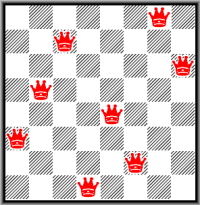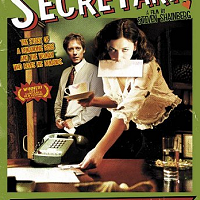
One solution to the puzzle.
I’ve written a lot lately about the physical versus the virtual. I’ve also written about algorithms and the role they play. In this post, I revisit both by exploring what is, for me, an old friend: The Eight Queens Puzzle. The goal is to place eight chess queens on a chessboard such that none can take another in a single move.
The puzzle is simple enough, yet just challenging enough, that it’s a good problem for first-year student programmers to solve. That’s where I met it, and it’s been a kind of “Hello, World!” algorithm for me ever since.
I thought it might be a fun way to explore a simple virtual reality.

 I don’t know if it’s having been in the saddle so long, having all this retirement time, or the magic of
I don’t know if it’s having been in the saddle so long, having all this retirement time, or the magic of 











